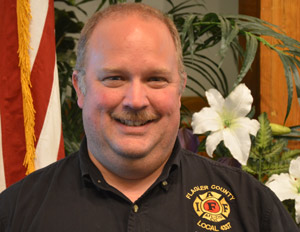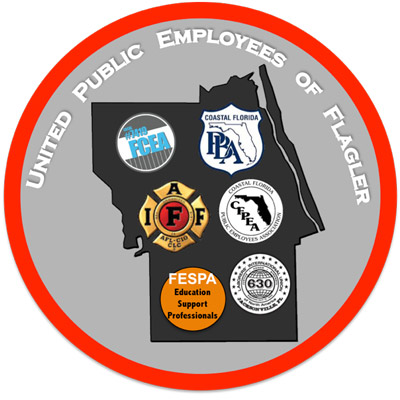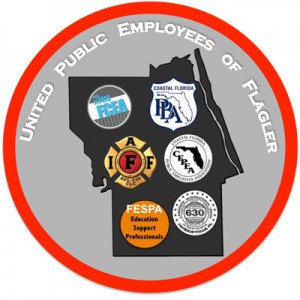After several years of efforts, Flagler County’s public-sector unions representing workers in a half dozen agencies—including police, firefighters, school employees and municipal workers—have joined forces in a new organization called the United Public Employees of Flagler.
The organization represents roughly 1,500 workers and well over double that number going by the households they represent, making it a potentially significant political force similar to the county’s home builders’ association, the Realtors’ association and the chamber of commerce—but from a labor perspective.
The association will not itself endorse political candidates under its name, but its method amounts to projecting the same unified voice—and the same influence on candidacies: Its member organizations will vet and agree to the same candidates, so that each union will independently endorse the same candidates they have agreed to, Stephen Palmer, who heads the county’s firefighters’ union and led the effort, said this evening: for example, if the teachers’ union supports candidate A for school board, then all other five unions will do so as well.
“They can change the way things go politically,” Palmer said, stressing that the association will be focusing on safety and intergovernmental communications as well as worker-retention issues: the unions want to see the various agencies better cooperate from a policy level, and they want more focus on critical safety infrastructure such as emergency radio communications, which affect day-to-day lives of residents and first-responders.
“I’ve been involved three years in the union,” says Jon Dopp, and Flagler County Sheriff’s deputy and the vice president of the Coastal Florida Police Benevolent Association. “Initially there was almost zero political presence from the PBA as far as local political matters were concerned.” The PBA ironically had pull in Tallahassee, but little influence locally. “I’ve had candidates tell me so much over the years. So we’re hoping to change that,” Dopp said.

Stephen Palmer, president of the Flagler County Professional Firefighters Association. (© FlaglerLive)
The group isn’t wasting time: it’s holding its first candidate forum for county commission and school board members on May 19 at the Hilton Garden Inn. The forum will double up as its vetting sessions on its way to deciding whom to endorse. Another forum will feature the long list of sheriff’s candidate, on June 22. Questions will be drawn from rank and file employees and a committee, and the forums will be moderated.
The idea of a union association began with Richard Bennett, a county firefighter and ex-president of the firefighters’ union until he was elevated to the dark side—he’s a captain now, making him part of management—leaving the work to Palmer and Dopp. They initially worked to join their unions, and the five candidates they endorsed in 2014 all won. “We hope to continue that success but to try to project what the future holds would be—I don’t know, I hope good things,” Dopp said, noting that the organization is just starting out.
The new association is in most ways a political response to the severe limitations on the powers of individual bargaining units, or union locals, under Florida law, a so-called “right-to-work” state that in effect shifts most labor-management authority to management: unions may bargain with governments, but in the end, the governing body—which almost always reflects the management it hired—decides arbitrates any differences, even after disagreements may have gone to an independent arbitrator: that independent arbitrator’s conclusions are only advisory recommendations.
So unions’ best alternative is to cultivate union-friendly city and county commissioners and school board members—or get them elected.
The approach was illustrated this afternoon in a bargaining session between Palm Coast government’s fledgling public works union with city management at Palm Coast City Hall. It was the third bargaining session since August. The meeting clarified positions—or hardened them—more than it resolved them, underlying continuing strains between city management and its unions. (The city’s firefighters are also unionized, and both are part of United Public Employees of Flagler.)
The public works union filed an unfair labor practice this week with the Florida Public Employees Relations Commission, charging the city for not bargaining in good faith. And 54 utility workers, or about a third of the workforce, signed a petition to dissolve the union, generating the sort of allegations from the union that shadow such developments: that the city is pressuring workers to reject the union, which would be illegal.
The city administration’s team consisted of Human Resources Director Wendy Cullen and attorney Jeff Mandell. The public works’ bargaining unit was led by Ronnie Burris. He was flanked by a dozen employees from public works, the city’s largest department. It unionized with a 61 percent favorable vote in July 2014. The department, which consists of 168 blue-collar workers, lost 33 workers last year alone, Burress said, citing the turnover as an indication of dissatisfaction.
The two sides didn’t get far today. The union had submitted a thirty-article contract proposal. According to the union, the city rejected it wholesale, rejecting even so much as wording taken directly from the city’s employee handbook, such as articles on family leave and a drug-free workplace. The reality is a bit more nuanced. The city did reject most articles, but not necessarily the intent behind the articles: it just doesn’t want its own employee policies supplanted by the union contract, even though the wording might be identical.
But the difference underscores the heart of the strain between the bargaining unit and the city: employees are looking for the additional protection that a contract provides. The city is telling the workers that its own policies provide that protection. In other words, the city is telling the workers: trust us. The workers are would rather not: they want to put their trust in a contract.
The point was made clear in the two sides’ differences over one article this afternoon, when the union asked for a system of setting special meetings with human resources to work out disciplinary issues before they turn into formal grievances. The city refused. “I have an open door policy,” Cullen said, inviting any employee to call her, speak with her, visit her whenever they need to bring issues to her attention.
“On the other side of the coin, who’s to say it won’t change down the road?” One employee around the table said.
The city, at any rate, refused to change its approach, and there was little the union could do. They moved on.

‘This group will ensure that all public employee unions in the county are communicating regularly and working together to advocate for our community and our members,’ a statement released today by the United Public Employees of Flagler says.
Talk turned to wages. Both sides agreed to consider a wage proposal yet to be submitted by the union. The union is looking for annual merit raises of 2 to 4 percent in addition to cost of living raises, as well as a change in how raises are calculated: currently, the city awards its cost of living increases based on each employee’s starting wage, regardless of whether that employee has been there one year or 10 years. In other words, if that employee started at $10 an hour, his or her cost of living raise increases, year after year, will be based on that $10 base rate, not on the new rate. Employees consider that unfair as the overall wage will rise very slowly. It limits their ability to “top out” in their wage scale.
“What we want to propose is that the raises are actually based on what they make, not on the lowest rate in the scale,” Burris said.
“Put it in writing,” Cullen said.
Burris had a more detailed wage proposal that included a $2,500 across the board raise for all bargaining unit employees followed by 3 percent annual raises. “And what are you basing that on? You have comparative data to show that that’s warranted?” Mandell, the attorney, asked. “Show us the data that would support us doing something different.”
No article can adequately reflect the tensions, the charges and counter-charges, the verbal chess moves—or verbal bullying—that takes place in a bargaining session: it’s the normal course for such sessions: the school board’s sessions a few years ago were even more abrasive, though the end result also reflected a board that’s been much more union-friendly, or at least union-tolerant, than the Palm Coast City Council, which tends to mirror its city manager’s disdain for unions. The council showed that favor when it sided with its manager ina contract dispute it had to arbitrate with the firefighters’ union in 2014. That decision sealed the firefighters’ first union contract with the city.
The contract the city is presenting its public works and utility workers is very similar to that firefighters’ contract, which in itself tells the tale of where the public workers’ union stands: pleas and bargaining aside, it’s ultimately at the mercy of the city’s decisions, even if it goes before the council.
That’s also why the new union is placing its hopes on the November elections, when it is working toward getting union-friendly council members elected in the three seats about to be vacated. It’s also why they joined the United Public Employees of Flagler.
The union and the city parted ways, agreeing to a subsequent bargaining session without setting a date. Though a public meeting, the city did not notice the meeting publicly, on its website, as it does all its other public meetings.
The shadiness is not unique to Palm Coast: not a single government agency in the county notices its union meetings on their websites, alongside all other public meetings, either.
http://flaglerlive.com/92106/public-works-bargaining-palm-coast/


